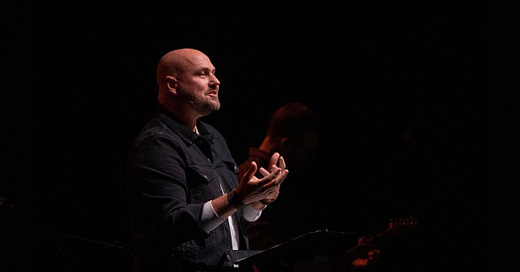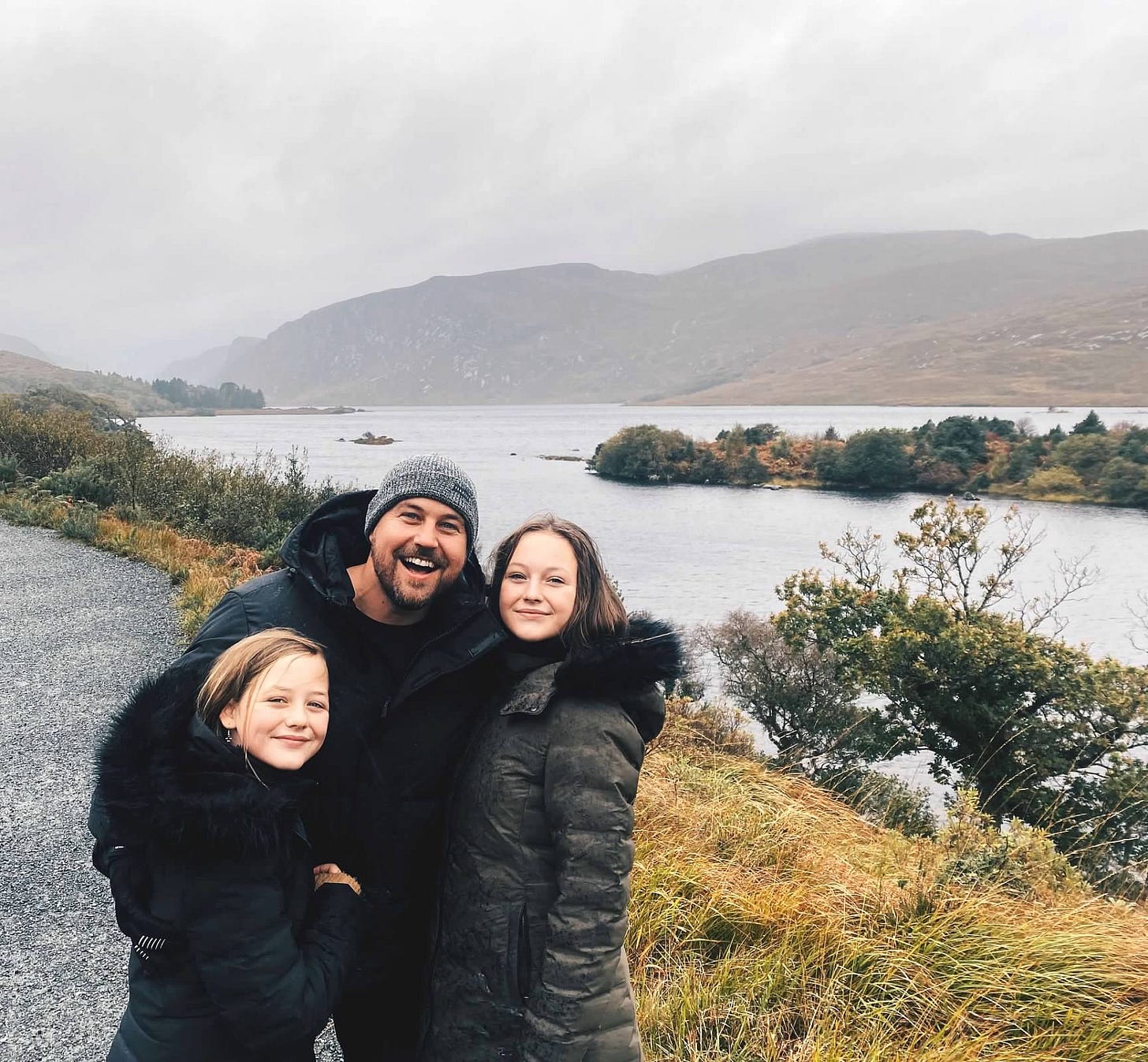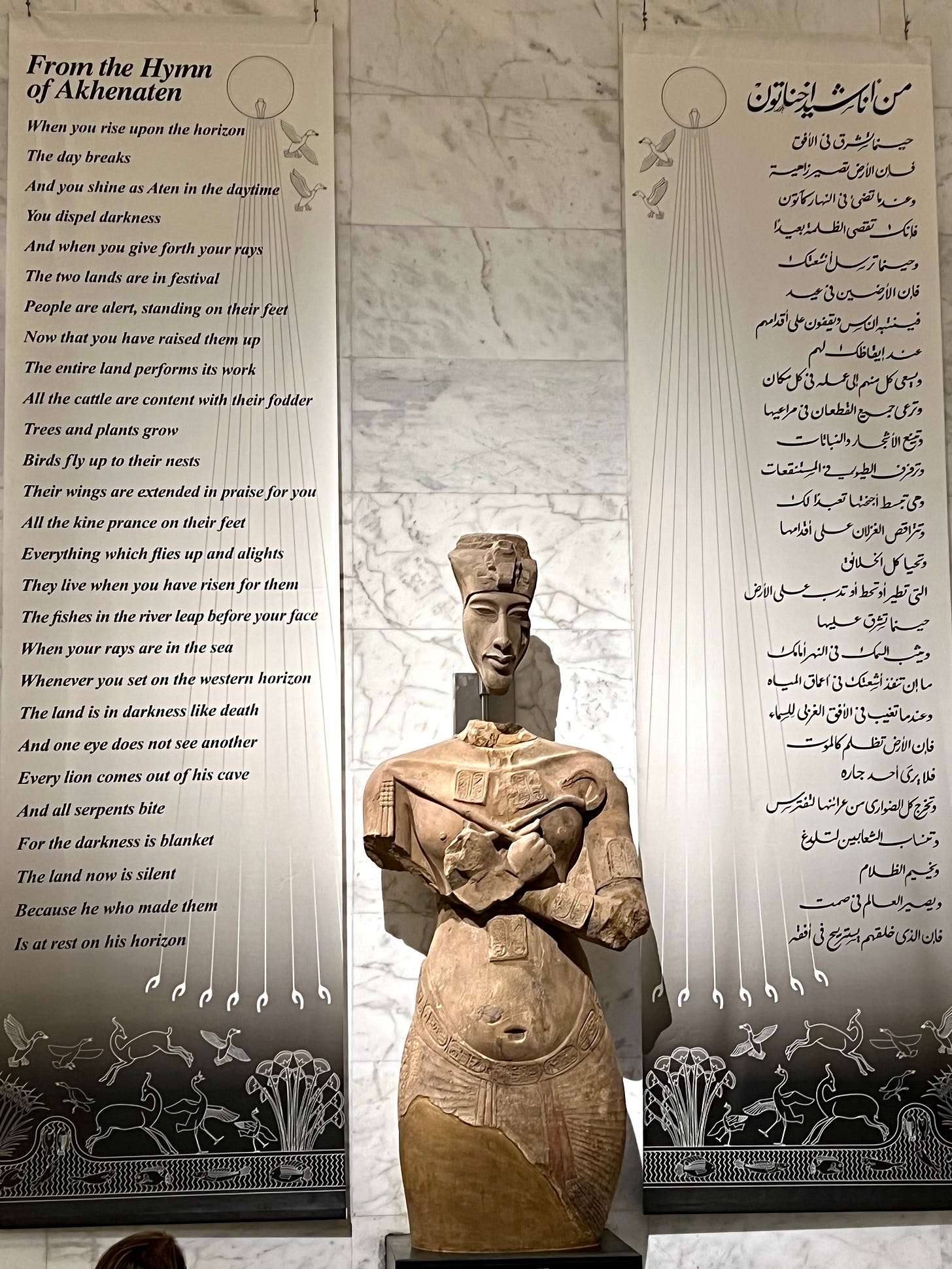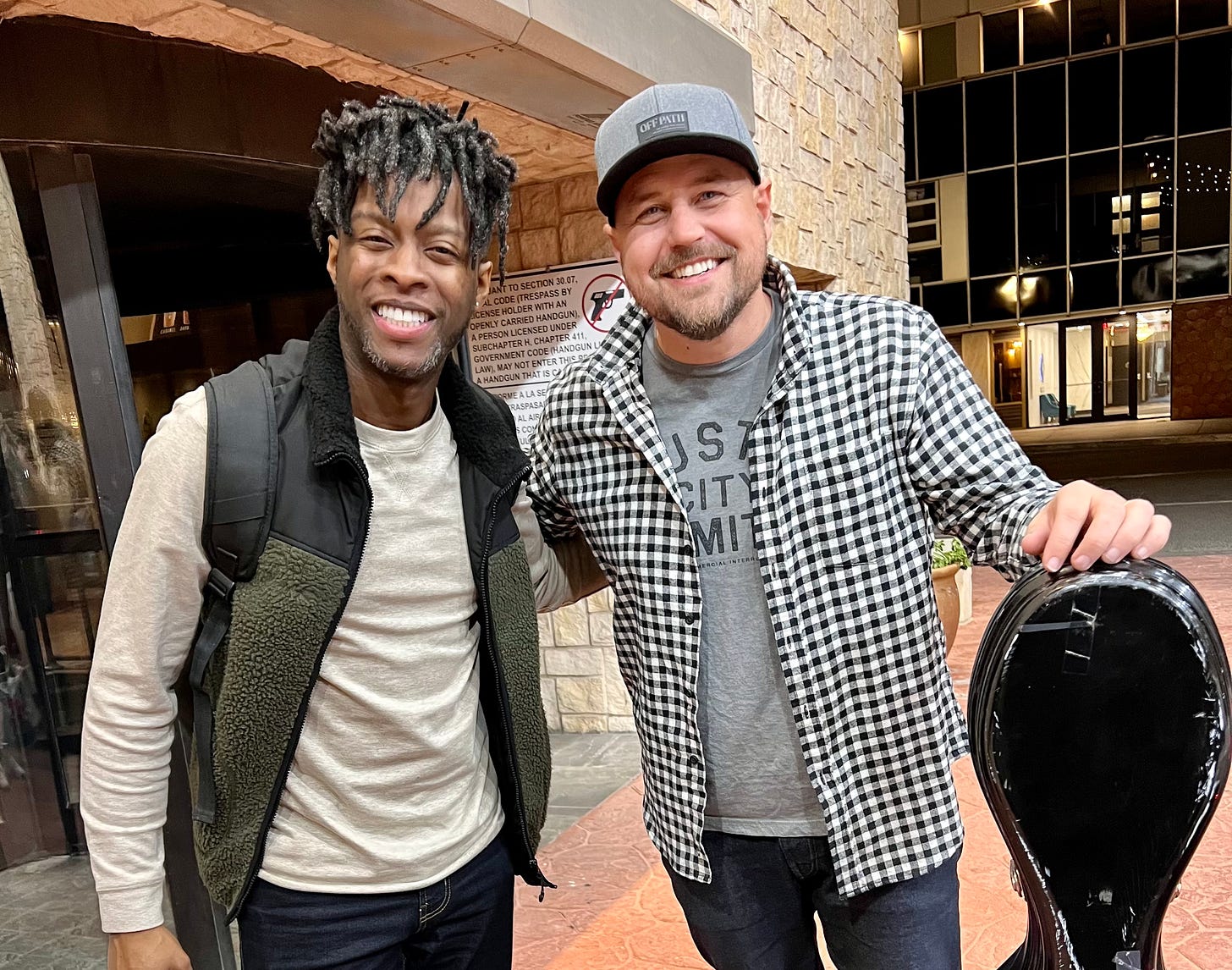A Peek At My Notes
My message to Kendall for this episode's score, plus a reason to join me in Ireland and the smallest bird you've ever seen
Hello! Hope you’re well. Here’s the latest:
Dirt Wednesday
I’m writing this on Ash Wednesday, a day generations of Christians have set aside as a solemn reminder of human mortality and our need for reconciliation with God. In Catholic (and some protestant) churches, congregants present their foreheads to be marked with ash and spoken over with these words: “Remember that you are dust, and to dust you shall return.”
Ash.
Dust.
Dirt.
Reading Robert MacFarlane’s Underland recently, I learned that British anthropologist Mary Douglas famously defined dirt as “matter out of place.” A simple but fascinating, apt definition. What we usually call “dirt” is a combination of broken down rock (sand, clay, silt) and decomposed plant material—matter…out of place. Dis-integrated. De-composed.
I think of Genesis 2: “ Then Yahweh God formed a man from the dust of the ground…” What a fascinating move. Instead of making this first human being appear out of thin area, Yahweh scoops dirt into His hands and forms the man. Yahweh puts the out-of-place matter into place—showed the dust its potential.
Of course, sin would break our relationship and millenia after that first moment, men and women around the would gather each year to receive on their foreheads an ashen mark, meditating on the truth that they are dust—temporal—fallible—sinful—in need of being brought back to God.
Matter…out of place.
No Other God
Last Sunday I had the privilege of sharing the Holy Ghost Stories treatment of Daniel 3 with Fellowship Fayetteville in Fayetteville, AR. It was an absolute joy to work alongside two incredibly talented musicians and usher folks into the story of the fiery furnace. Seeing people shed tears as the story broke into worship just filled me with delight and gratitude.
If you’ve listened to this episode of Holy Ghost Stories, you’ve probably picked up on my take on this story: while Shadrach, Meshach, and Abednego provide an extraordinary example of faith and Yahweh’s presence with them in the fire is a glorious grace…the text seems to focus squarely on Yahweh’s startling pursuit of the pagan king. I think the point isn’t so much “Be like Shadrach, Meshach, and Abednego,” but “You are Nebuchadnezzar. (And Yahweh loves you.)”
I love that.
Ireland-Bound
Next month I’m headed with my family to Ireland for a series of Holy Ghost Stories Live events. A friend in Derry (Adam Montgomery, with whom I made this last year) and I have been working together for a few months on a time of story and worship we’ll have the privilege of bringing to a handful of churches in both The North and The South. I’ll tell the story of Ezekiel a lá this episode, Adam will share some powerful songs he’s written, we’ll have some focused moments of meditation and prayer…it should be a beautiful time of worship and encounter.
If you’re reading this in Ireland or the UK, hit me back and I’ll give you details on where we’ll be and when.
My family and I lived in Ireland for a while during our travels and connected deeply with several folks in Derry. I can’t wait to breathe the air of the Causeway Coast and make something beautiful with my friend as we welcome the Spirit to move in story and song.
HGS Live in Nebraska
Speaking of story and song, I’m doing a Holy Ghost Stories Live show alongside some incredible musicians and vocalists at York University about 2 hours outside of Omaha on March 13.
York is generously sponsoring this event and tickets are just $5, but space is limited. The last Holy Ghost Stories Live show sold out, and we’ve got less room at this one—so register while you can at holyghoststories.org/live.


(By the way, if you’d like to bring HGS Live to your church/organization in 2024, email me.)
It Comes to Blows
This week saw the release of Part 4 of The Exodus over at Holy Ghost Stories. And wow—what an episode this is. The plague of frogs, darkness covering the land, the very first Passover, the chilling death of the firstborn throughout Egypt…it’s full of extraordinary moments crafted by a God with a penchant for substantive spectacle.
Here are a few items of interest related to the episode:
Fathering 101 - In the introduction of this episode, I focus on Yahweh’s intentionality as a Father—specifically, a Father working to create powerful memories for His children. This is an approach to parenting my wife and I talk about at length during our Storied Family workshops. When I read stuff like The Power of Moments, I can’t help thinking of Yahweh as the ultimate parent and moment/memory maker.
The Ten Punches - As Tim Mackie points out in this excellent episode of the Bible Project podcast, while we’ve settled on the term “Plagues,” the narrator of Exodus actually uses multiple words to describe Yahweh’s acts in Exodus 6-11. In fact, only one of these signs is a true plague or illness—and in that particular case the word “plague” is a translation of a Hebrew word used throughout the narrative: nagaph (“to hit or strike”). You’ll notice I’ve echoed that meaning in the way I describe these 10 acts in this episode.
De-Creation Everywhere - A prevailing theme in Yahweh’s ten acts of judgement on Egypt is de-creation—that is, a systematic unraveling of the created order. This would have been especially unsettling for the Egyptians, who saw the predictable interworkings of the world around them as a gracious act of the gods mediated by the Pharaoh himself. The frogs, the flies, the hail—all of it—upsets everything the Egyptians (and Pharaoh) think they know to be true. (There’s a great discussion of this in the podcast episode I mentioned above.)
The Hymn of Akhenaten - During my research trip to Egypt, I saw this enormous banner hanging on the wall at the National Museum of Egyptian Civilization in Cairo:
This hymn, offered in worship to the sun god, was likely written (drawing on then-ancient sentiments) sometime around 1353–36 BC—making it an old song by the time of Moses (depending, of course, on your choice of date for the Exodus). Its sentiments seemed a fascinating backdrop for the plague of Darkness, so I couldn’t help but work it into this episode.
Yahweh has a Friend - Once Israel has left Egypt, the text will describe Yahweh’s regular interactions with Moses thusly: “Yahweh would speak to Moses face to face, as one speaks to a friend” (Ex 33:11). Fascinating. That evolving friendship has been on my mind as I’ve worked through the story, and I chose in this episode to nod to its nascent form. It was a beautiful exercise to reflect on how much joy this budding relationship must have brought Yahweh.
Death of the Firstborn - It was quite sobering to spend extended time imagining the horrors of the final plague. Good, too, to remember this was a reversal of the genoscidal acts inflicted on the Hebrews a few generations earlier. (What an unsettling thing it must have been for Moses to interact with thousands of Israelites and not see anyone exactly his age…because they’d all been slaughtered.)
“Please bless me.” - What a deeply poignant moment it is as Pharaoh begs for a blessing from the prophet who’s bested him. That will always haunt me.
Moses Writes a Song - The final scene of this episode has us fast-forwarding to the day Moses writes Psalm 91. (We don’t know for sure that Moses wrote this particular psalm, though Jewish tradition attributes it to him and I cannot help but notice striking parallels between its lyrics and Moses’ experience with the plagues and Israel’s protection in Goshen. For the purposes of telling this part of the story, I’ve chosen to presume Moses’ authorship.)
I loved being able to end the episode this way, and I was thrilled to see how Kendall scored this scene. Here are my notes to him as he began composing:
“The following is from Psalm 91, which is commonly attributed to Moses. There’s a fun opportunity here for you to ‘write the song’ in a sense—to set the lyrics apart a bit with what you do musically, moving between them and the interspersed narration. Just remember this: I’d like this last scene to be emotional—we want to feel Moses’ happiness, his growing affection for Yahweh, the fear and pain he experienced in Egypt, the complicated satisfaction of watching the Egyptians suffer their punishment…and also Yahweh’s tender care, and His gladness in that last couplet that someone, finally, loves Him. In other words, Kendall, make us cry.”
Hopefully you’ll agree as you listen: Kendall understood the assignment. Oh—and those vocals towards the end of the scene? That’s Kendall singing. :)
I hope “It Comes to Blows” blesses you richly and leads you into an encounter with Yahweh you won’t soon forget. If you’ve already listened, I’d love to hear your thoughts/impressions—just reply to this email.
APPLE PODCASTS | SPOTIFY | GOOGLE PODCASTS | AUDIBLE
Review Spotlight
Before I sign off, I just have to share this incredible (actual) review from a listener named Richard over on Audible:
⭐️⭐️⭐️⭐️⭐️ “Spiritual and Entertaining - Delivering the stories of the Bible in an entertaining way. I miss you Dewanda.”
I don’t know who Dewanda is, but I’m honored to be a part of her and Richard’s story.
Patreon’s Growing
If you want to be someone who goes beyond consumption and engages in creation, join the growing tribe of HGS partners over on Patreon. Bonus episodes, remixed scenes, discussion questions—there’s some great thank-you stuff waiting for you, but the big win is that you’ll go to sleep tonight knowing that you helped Kendall and I share the story of the Exodus with people all over the world.
See you on Patreon!
5 Cool Things
Skeletons in the Closet - Remember that time a man knocked down a wall in his house to find an entire underground city? For real—he was trying to figure out why his chickens kept disappearing…
Tiniest Bird - Want to see a Zebra Finch hatchling? Today’s your lucky day.
Great Scot - The Scottish dialect Harry Potter is a trip. Harry’s described as “skinny malinkey,” Quidditch is “Bizzumbaw,” Dumbledore is “Dumbiedykes”…
Pharaoh in the Flesh - A reader reminded me of this incredible reconstruction of Ramesses II’s face, based on his (incredibly well-preserved) remains. (Thanks, Trish!)
Glass Onion, but Make it Muppets - This is just masterful.
That’s the latest! Hope you’re blessed by “It Comes to Blows.” Let me know if this episode has you seeing/thinking/feeling anything new as you enter the story—I love hearing that stuff.
Gratefully,
Justin
*Know someone who needs this newsletter in their life? Pass it on to them.
**Did someone cool pass this on to you? Subscribe here for free:








wow look at this tiny zebra finch it reminds me my kid singing the song Africa by toto in celebration to success in his school examination he even act like a lion like zebra and also dancing very funny very funny i love it https://www.youtube.com/watch?v=b-fjnL2Tqws